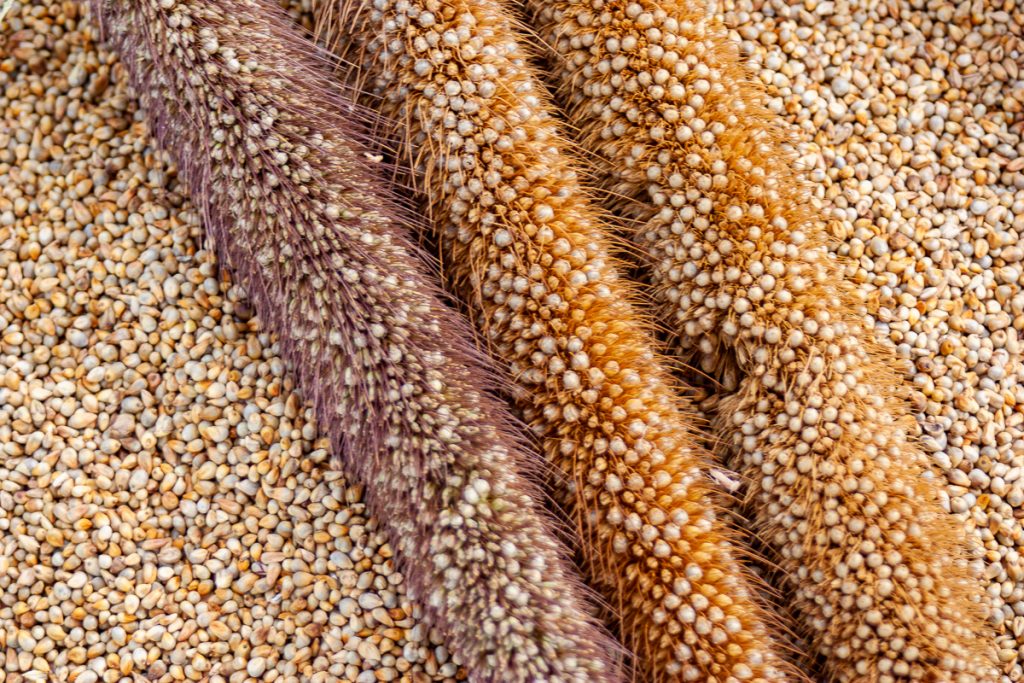
Traditional maize seed varieties revived by farmers in Elukwatini, Mpumalanga, South Africa, also used for brewing traditional beer (Photo Rob Symons)
Recuperation of lost indigenous seeds reawakens the cultural memory of the forgotten meals, rekindles hope of continuity, and gets communities working together again. Women’s prowess in seed knowledge, selection, saving practices as well as knowledge of indigenous seed storage structures come out through dialogues, an approach EarthLore uses in their work with the communities. Here EarthLore’s Sheila Berry tells us more of their work in Zimbabwe.
Back in mid-2016, when Baba and Mai Mukondo, an elderly Bikita couple from Mamutse, Zimbabwe, revealed that they had the only source of svoboda seeds in the area, the news rekindled hope for the communities, just like the news of rain to farmers after a long dry year. For years, the couple had kept a tiny packet of this small grain hidden in their home. One day, they felt ready to produce the surprise package at one of the community dialogues. Svoboda had become unpopular when hybrid maize was heavily marketed and became the staple seed in the area. Traditional and indigenous seeds lost popularity since farmers stopped planting them. As a result many local seeds were lost.
Great excitement and ululations filled the air during the sharing of the seeds with other farmers for propagation. The trust Baba and Mai Mukondo placed in the Mamutse community was justified.
Currently, many seeds are produced and propagated every season to ensure that svoboda, almost lost to Bikita and surrounding areas, is once again secure and plentiful. Sadly, Mai Mukondo passed away the same year, soon after the svoboda seeds yielded abundant new life. But we trust her spirit is happy in the knowledge that she and Baba Mukondo made a significant contribution to the revival of this indigenous seed in Zimbabwe.

Bountiful beans shared at seed fairs and on exchange visits. Nutritious and healthy, they are an important source of protein (Photo Rob Symons)
EarthLore has been a member of the ABN (African Biodiversity Network) family since its founding in 2007. Her mission is to accompany traditional rural farming communities on their journeys of becoming seed and food sovereign while strengthening their culture, traditions, and systems of African spirituality.
EarthLore accompanies communities in both Zimbabwe and South Africa to assist them to bring back lost indigenous seeds. The importance of these seeds reawakens the cultural memory of forgotten meals, assures continuity, and are a crucial element of performing rituals, composing of songs, dances, conservation of the Sacred Natural Sites (SNS) and governance systems that support and maintain sacred places and spiritual practices. The seeds acknowledge the vital roles that women complement. Remembering these elements helps a community reweave their lives back to working together and increases biodiversity by working harmoniously with nature. It may take years of community dialoguing before treasured seeds surface together with associated knowledge of specific places, rituals, and ceremonies. Patience is essential. So is respect.
These traditional and spiritual systems respect age, gender, Mother Earth and all her life forms and build solidarity, resilience, and the capacity of the ignored communities to claim back control over their lives and livelihoods. Through this, they become empowered to protect and promote biodiversity and defend their land against growing threats from climate change, mining, industrial exploitation, land grabbing, among other practices injurious to the earth.

Pearl millet-a robust crop revived by Bikita farmers in Zimbabwe. The stiff hairs deter birds by pricking them in their eyes when they try to eat the seeds. (Photo Rob Symons)
Women as the custodians of the indigenous seed knowledge
When we started journeying with rural farming communities in South Africa and Zimbabwe, we focused on reviving the source of life, namely traditional and indigenous seeds. Seeds produce more than food. They quickly unlock a vast store of knowledge about the seed and farming practices. The keepers of the almost forgotten knowledge of traditional seeds and farming practices are the elders – many of whom are women. These women elders have been ignored for many years and considered useless because they have not gone to formal schools, are often unfamiliar with mobile phones and other modern trends and technologies.
It takes time and patience to build levels of trust that encourage these elders to share their priceless knowledge with the confidence that what they have held dear for so long will be respected and appreciated. Through regular dialogues, EarthLore builds deep-trusting relationships with knowledge holders. Initially, we hold dialogues with individuals or small groups of elders until they feel ready to include the broader community. It is a fragile process at the beginning. But, like all things indigenous to an area, once trust has taken root, it grows and becomes robust, resilient and able to weather extreme climate conditions and shocks, including the Covid-19 pandemic.
Our approach to each dialogue is to be open to what emerges and carefully track the energy that flows in the group and follow this energy. There is no hidden agenda. What is required is only a willingness to receive the seeds of knowledge shared and nourish them as Mother Earth does to the seeds planted in her soil.
Women know about seed selection, seed saving practices and indigenous seed storage structures. It is through the dialogues that this information slowly emerges. Patience and a deep interest in what is shared are crucial for assimilation by those who are listening. Seeds are at the heart of the rituals, celebrations and ceremonies that provide indigenous and traditional peoples with opportunities to express their unique cultures and, in the process, build dignity, pride and confidence in who they are. The next time we see a seed, may we be aware of the wealth it holds and be able to see the world in a grain of svoboda.
This article also appeared on the African Biodiverstity Network website.





